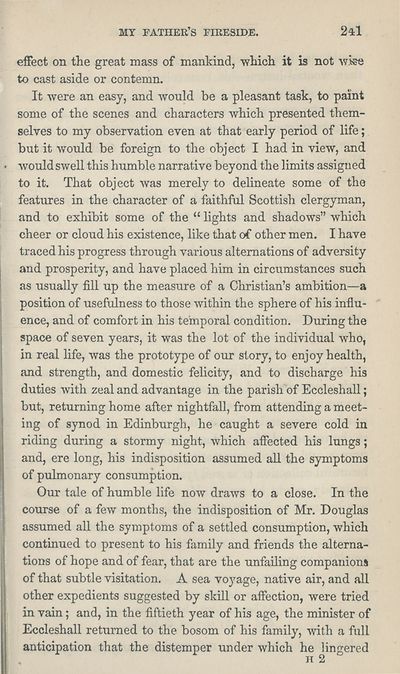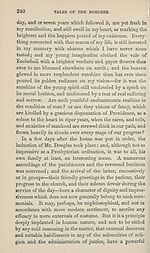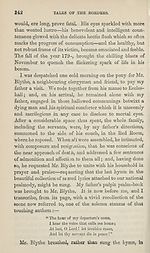Download files
Complete book:
Individual page:
Thumbnail gallery: Grid view | List view

MY FATHER’S FIRESIDE.
241
effect on the great mass of mankind, which it is not wise
to cast aside or contemn.
It were an easy, and would be a pleasant task, to paint
some of the scenes and characters which presented them¬
selves to my observation even at that early period of life;
but it would be foreign to the object I had in view, and
would swell this humble narrative beyond the limits assigned
to it. That object was merely to delineate some of the
features in the character of a faithful Scottish clergyman,
and to exhibit some of the “ lights and shadows” which
cheer or cloud his existence, like that of other men. I have
traced his progress through various alternations of adversity
and prosperity, and have placed him in circumstances such
as usually fill up the measure of a Christian’s ambition—a
position of usefulness to those within the sphere of his influ¬
ence, and of comfort in his temporal condition. During the
space of seven years, it was the lot of the individual who,
in real life, was the prototype of our story, to enjoy health,
and strength, and domestic felicity, and to discharge his
duties with zeal and advantage in the parish of Eccleshall;
but, returning home after nightfall, from attending a meet¬
ing of synod in Edinburgh, he caught a severe cold in
riding during a stormy night, which affected his lungs;
and, ere long, his indisposition assumed all the symptoms
of pulmonary consumption.
Our tale of humble life now draws to a close. In the
course of a few months, the indisposition of Mr. Douglas
assumed all the symptoms of a settled consumption, which
continued to present to his family and friends the alterna¬
tions of hope and of fear, that are the unfailing companions
of that subtle visitation. A sea voyage, native air, and all
other expedients suggested by skill or affection, were tried
in vain; and, in the fiftieth year of his age, the minister of
Eccleshall returned to the bosom of his family, with a full
anticipation that the distemper under which he lingered
h 2
241
effect on the great mass of mankind, which it is not wise
to cast aside or contemn.
It were an easy, and would be a pleasant task, to paint
some of the scenes and characters which presented them¬
selves to my observation even at that early period of life;
but it would be foreign to the object I had in view, and
would swell this humble narrative beyond the limits assigned
to it. That object was merely to delineate some of the
features in the character of a faithful Scottish clergyman,
and to exhibit some of the “ lights and shadows” which
cheer or cloud his existence, like that of other men. I have
traced his progress through various alternations of adversity
and prosperity, and have placed him in circumstances such
as usually fill up the measure of a Christian’s ambition—a
position of usefulness to those within the sphere of his influ¬
ence, and of comfort in his temporal condition. During the
space of seven years, it was the lot of the individual who,
in real life, was the prototype of our story, to enjoy health,
and strength, and domestic felicity, and to discharge his
duties with zeal and advantage in the parish of Eccleshall;
but, returning home after nightfall, from attending a meet¬
ing of synod in Edinburgh, he caught a severe cold in
riding during a stormy night, which affected his lungs;
and, ere long, his indisposition assumed all the symptoms
of pulmonary consumption.
Our tale of humble life now draws to a close. In the
course of a few months, the indisposition of Mr. Douglas
assumed all the symptoms of a settled consumption, which
continued to present to his family and friends the alterna¬
tions of hope and of fear, that are the unfailing companions
of that subtle visitation. A sea voyage, native air, and all
other expedients suggested by skill or affection, were tried
in vain; and, in the fiftieth year of his age, the minister of
Eccleshall returned to the bosom of his family, with a full
anticipation that the distemper under which he lingered
h 2
Set display mode to:
![]() Universal Viewer |
Universal Viewer | ![]() Mirador |
Large image | Transcription
Mirador |
Large image | Transcription
| Antiquarian books of Scotland > Scotland/Scots > Wilson's tales of the Borders and of Scotland > Volume 3 > (537) |
|---|
| Permanent URL | https://digital.nls.uk/109235407 |
|---|
| Description | Thousands of printed books from the Antiquarian Books of Scotland collection which dates from 1641 to the 1980s. The collection consists of 14,800 books which were published in Scotland or have a Scottish connection, e.g. through the author, printer or owner. Subjects covered include sport, education, diseases, adventure, occupations, Jacobites, politics and religion. Among the 29 languages represented are English, Gaelic, Italian, French, Russian and Swedish. |
|---|

